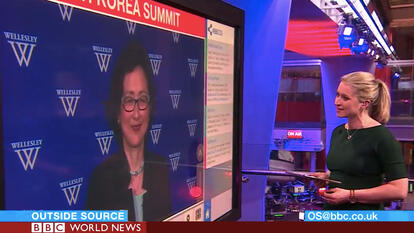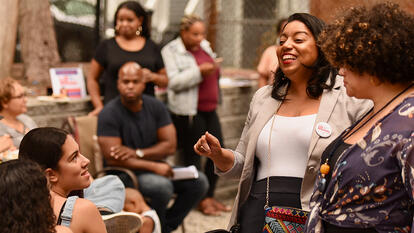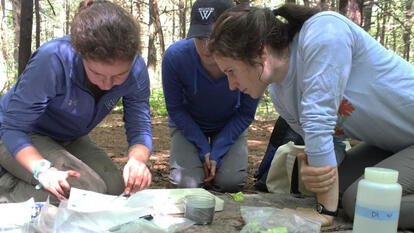This International Women’s Day, Meet Four Wellesley Students and Alumnae Advocating for A Gender Equal World

March 8 is International Women’s Day, and this year’s theme, #EachforEqual, is a nod to UN Women’s yearlong celebration of the 25th anniversary of the Beijing Declaration and Platform for Action, launched at the 1995 UN Fourth World Conference on Women. A progressive roadmap for the empowerment of women and girls around the globe, UN Women’s celebration, I am Generation Equality: Realizing Women’s Rights, embodies the memorable charge Hillary Rodham Clinton ’69 made at that historic gathering, when she announced to the world: “Human rights are women’s rights and women’s rights are human rights.”
In recognition of International Women’s Day, we invite you to meet a few of Wellesley’s incredible students and alumnae who are working for women’s rights and gender equality around the world by challenging norms, celebrating diversity, and dispelling stereotypes.
Here, we hear from two students and two alumnae who are dedicated to improving their communities and the world on a global scale. They represent the new generation of leaders and gender equality activists who are following in the footsteps of the visionaries who established the Beijing Platform.
Ice sheet glaciologist Laura Stevens ’11 studies the impact of atmospheric and oceanic warming on the stability of the Earth’s continental ice sheets in Antarctica and Greenland. She also serves as a mentor for scientists who identify with the LGBTQ+ community.
Mayrah Udvardi ’14 is an architectural designer at MASS Design Group in Boston, supporting communities in becoming more just and sustainable by reimagining their built environments. Her projects have ranged from tribal relocation design in Louisiana’s lowlands to the adaptive reuse of an old theater in the Midwest to empower local artisans.
Mar Barrera ’20, a Middle Eastern studies major with and minor in health and society, is an advocate for the trans+ community. Barrera has worked extensively with Wellesley’s Office of Intercultural Education and the LGBTQ+ office and hopes to use their advocacy skills to work with community health centers focusing on queer health.
After Wellesley, Laïssa Alexis ’20 hopes to work in the human rights field. Born in Haiti, the peace and justice studies major wants to work to remove hegemonic structures of power so that people in marginalized groups can receive equal opportunities. She has worked with refugees and migrants in Senegal and is currently writing a thesis examining the African Union and its enforcement of human rights.
Hear from three international Wellesley students in part one of this two-part International Women’s Day series, and follow the celebration on social media.
Q: What gender equality issues are most important to you?
Laura Stevens ’11: Lately, I have been thinking about how to increase understanding around the ways varied personal perspectives and voices can bring innovative approaches to scientific problems and STEM education. Incorporating sexual and gender identity into curriculum has been accepted in the social sciences and humanities; however, the physical sciences lag far behind. The STEM curriculum is incredibly heteronormative. This issue is important to me because while my queer theory and STEM courses have never overlapped, I am always employing both approaches to be a successful queer scientist.
Mayrah Udvardi ’14: Emotional labor is a topic I’ve been thinking about a lot lately, particularly in an office environment in which women are increasingly present. Since its conceptualization in the 1970s as a term to account for unpaid labor by women, emotional labor has adopted a pretty negative valence. If we can start to see the idea of taking care of each other as a benefit, rather than a burden, I believe we can start to uproot many of the toxic systems that plague our world’s work cultures.
Mar Barrera ’20: I spend a great deal of time thinking and reflecting about the gender binary. I hope for all people to have the space and time required to consider what their gender means to them, and how internalized messages of gender-related expectations have prevented them from an internal sense of peace. I believe transgender people have an integral role to play in dismantling the ingrained forms of categorization that damage not just themselves, but all people subject to gender-based violence.
The answer to all forms of gender-based oppression comes with communities that examine and are conscious of what gender is, and how at an individual level we relate to our gender. My goal is not to erase femininity or masculinity, we simply need to be more conscious of gendered expectations and how we can understand each other without those toxic expectations.
Laïssa Alexis ’20: I would like to see a conversation about gender that is not binary and interested in deconstructing the way we think about gender. Some other issues that are important to me are equal access to healthcare (the maternal mortality rate is higher among black people), the environment, and labor but not just in terms of the gender wage gap.
Q: What achievements by other women inspire you? Who are your heroes?
LS: One of my heroes is Nergis Mavalvala ’90. Among her many achievements, Mavalvala was the associate department head of the physics department while I was at MIT during my PhD. I would see her on the MIT squash courts and get a boost of Wellesley pride. Mavalvala inspires me with her tenacity to persevere with really difficult research problems, where the answer may be decades down the line. She has an inquisitive, electrifying presence, and you can tell the teams she leads are excited to be working with her. She is also another queer Wellesley alum in the physical sciences, and there are not many of those.
Other heroes of mine include many of my peers. I see my generation of queer scientists making space and positive environments for themselves and others. They’re pushing back on engrained, biased structures within academia. They are my biggest source of inspiration.
MU: One of the best parts of my job is getting to work with path-breaking women who model leadership, passion, and balance. Architecture is one of the many fields with huge disparity between the number of women seeking education (42 percent) and the number of women earning licensure (20 percent). Even in the last couple of years, I’ve seen [MASS Design Group’s] Boston office transform from being nearly entirely led by male principals to being led by more women.
Furthermore, the strides [MASS Design Group] is taking both in the U.S. and in Rwanda to empower architects of color is having ripple effects into the communities we work with. By modeling a more inclusive architectural practice, we further legitimize the work being done by our female- and POC-identifying partners and stakeholders.
MB: A personal hero of mine is my friend Ninotska Love DS ’20. Ninotska and I have grown closer this semester through planning Trans+ Week of Visibility together, and the unapologetic way in which she moves through the world is something I admire and strive for. Ninotska effortlessly lifts up everyone she meets and brightens her community with her presence. Our friendship is something I’m deeply grateful for, in no small part due to the fact that several years back it wouldn’t have happened, as Ninotska is a transgender woman. She is a role model for so many people on campus who look up to her bravery, wit, fashion sense, and ambition. I truly believe she will change our world for the better.
LA: I am inspired by women who have strong values and voices and never waver. I do not believe in deifying ordinary people, but some women of the many who inspire me are Angela Davis, Claudia Jones, and Toni Morrison. I am inspired by the way these women challenged the status quo.
Q: What do you want women to achieve in your lifetime?
LS: Everything! In my 30-year lifetime, we have witnessed a lot of “firsts” for women. I would hope, moving forward, that these “firsts” do not turn into “lasts,” but are followed by communities of women and queer people remaking sexist institutions into versions that better serve historically marginalized communities.
MU: I want a female president.
MB: I hope to see the incidences of violence against trans women, in particular trans women of color, fall to zero. This task can only be accomplished with the dismantling of systems of misogyny.
LA: I want women and all marginalized gender identities to be recognized for their fullness as individuals and allowed the space to be human. I would love to see more representations of women, particular black and indigenous women in the U.S., in media, politics, science, etc.; not just a sort of empty form of representation but one that really moves the needle. I would also love to see a real international solidarity effort among the women of the world.
Photo (left to right): Mar Barrera ’20, Laïssa Alexis ’20, Laura Stevens ’11, and Mayrah Udvardi ’14



